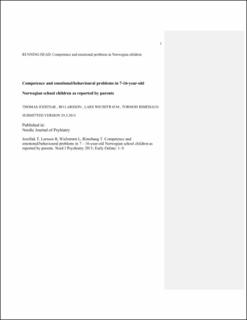Competence and emotional/behavioural problems in 7-16-year-old Norwegian school children as reported by parents
Journal article
Submitted version
Permanent lenke
https://hdl.handle.net/11250/3059189Utgivelsesdato
2012Metadata
Vis full innførselSamlinger
- Institutt for psykisk helse [1301]
- Institutt for psykologi [3103]
- Publikasjoner fra CRIStin - NTNU [38127]
- Publikasjoner fra Cristin - St. Olavs hospital [1539]
- St. Olavs hospital [2511]
Sammendrag
Background: Previous studies from Nordic countries suggest that parent ratings of children's emotional and behavioural problems using the Child Behavior Checklist (CBCL) are among the lowest in the world. However, there has been no Norwegian population study with acceptable response rates to provide valid Norwegian reference data. Aims: Firstly, to compare CBCL Internalizing, Externalizing, Total Problems and Competence scores of Norwegian children and adolescents with those from 1) previous Norwegian studies, 2) other Nordic countries, and 3) international data. Secondly, to present Norwegian reference data in order to perform these comparisons. Thirdly, to investigate the effects of age, gender, socio-economic and urban/rural status on the CBCL. Methods: A stratified cluster sample of 2582 school children (1302 girls and 1280 boys) was identified from the general Norwegian population and their parents were asked to complete the CBCL. Results: The response rate was 65.5%. The mean Total Problems score for the whole sample was 14.2 (standard deviation, s = 14.1). Girls were rated as having greater Competence and fewer Total Problems than boys. Younger children had more Total Problems than adolescents. Parents with low education reported more child Total Problems and lower Competence than those with high education. All effect sizes were small, except for the effect of parental education on child Competence, which was moderate. Conclusions: Total Problems scores were lower than in other societies. The data from this study obtained from one county in central Norway provide an important reference for clinical practice and treatment outcome research.
